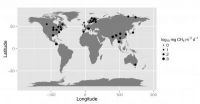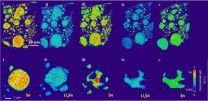(Press-News.org) ITHACA, N.Y. – Those hoping to dilute Americans' taste for soda, energy drinks, sweetened tea, and other sugary beverages should take their quest to school lunchrooms rather than legislative chambers, according to a recent study by media and health policy experts.
Soda taxes and beverage portion size restrictions were unpalatable to the 1,319 U.S. adults questioned in a fall 2012 survey as part of a study reported online this month in the journal Preventive Medicine.
Adding front-of-package nutrition labels and removing sugary beverages from school environments garnered greater support: 65 percent and 62 percent, respectively – compared to 22 percent for taxes and 26 percent for portion size restrictions.
"I think these findings reflect public enthusiasm for regulation that maintains a value on consumer choice in the marketplace rather than government intervention, while tolerating more paternalism in restricting the choices available to children," said lead author Sarah Gollust, assistant professor in the Division of Health Policy and Management at the University of Minnesota School of Public Health.
The study is the first of its kind to assess the levels of public support for multiple policies to promote public health and prevent obesity through the reduced consumption of sugar-sweetened beverages. It was conducted in collaboration with Colleen Barry, associate professor in the Department of Health Policy and Management at Johns Hopkins Bloomberg School of Public Health, and Jeff Niederdeppe, assistant professor of communication at Cornell University.
"Strategies to reduce consumption of sugar-sweetened beverages are a key component of public health promotion and obesity prevention, yet the introduction of many of these policies has been met with political controversy," they wrote in the study. "The results provide policymakers and advocates with insights about the political feasibility of policy approaches to address the prevalent consumption of sugar-sweetened beverages."
Advocates of reduced sugar consumption might also want to borrow a page from the tobacco opponents' playbook, according to Niederdeppe, who has done research into the effectiveness of large-scale anti-tobacco media campaigns.
"Increasingly, health advocacy groups have focused attention on the behavior of the beverage industry, highlighting their marketing tactics aimed at young people and their heavily-funded efforts to oppose regulation. And similarly to the patterns we've seen over the years with big tobacco companies, people with negative views of soda companies are in favor of stricter regulations on their products," Niederdeppe said.
"Unlike many other health issues like alcohol and tobacco, parents have not yet been mobilized to advocate for policy strategies to change their children's beverage consumption," Niederdeppe said.
The findings of a strong positive relationship between years of education and policy support may suggest rising recognition among higher socioeconomic status groups of the value of policy interventions to reduce consumption of sugar-sweetened beverages, the study authors wrote.
INFORMATION:
The study was funded by the Robert Wood Johnson Foundation Healthy Eating Research Program.
Cornell University has television, ISDN and dedicated Skype/Google+ Hangout studios available for media interviews.
People unwilling to swallow soda tax, size restrictions
2014-03-27
ELSE PRESS RELEASES FROM THIS DATE:
Agroforestry systems can repair degraded watersheds
2014-03-27
NAIROBI, Kenya. (27 March 2014) ----Agroforestry, combined with land and water management practices that increase agricultural productivity, can save watersheds from degradation.
A study conducted by the World Agroforestry Centre (ICRAF) in the Gabayan watershed in eastern Bohol, Philippines, has shown that agroforestry systems create a more sustainably managed watershed that allows people living there to benefit from the ecosystem. The benefits include higher crop yields, increased income and resilience to climate change.
Agroforestry is an integrated land-use management ...
Scientists watch nanoparticles grow
2014-03-27
This news release is available in German. With DESY's X-ray light source PETRA III, Danish scientists observed the growth of nanoparticles live. The study shows how tungsten oxide nanoparticles are forming from solution. These particles are used for example for smart windows, which become opaque at the flick of a switch, and they are also used in particular solar cells. The team around lead author Dr. Dipankar Saha from Århus University present their observations in the scientific journal Angewandte Chemie – International Edition.
For their investigation, the scientists ...
Record quantum entanglement of multiple dimensions
2014-03-27
The states in which elementary particles, such as photons, can be found have properties which are beyond common sense. Superpositions are produced, such as the possibility of being in two places at once, which defies intuition. In addition, when two particles are entangled a connection is generated: measuring the state of one (whether they are in one place or another, or spinning one way or another, for example) affects the state of the other particle instantly, no matter how far away from each other they are.
Scientists have spent years combining both properties to construct ...
A more potent greenhouse gas than CO2, methane emissions will leap as Earth warms
2014-03-27
While carbon dioxide is typically painted as the bad boy of greenhouse gases, methane is roughly 30 times more potent as a heat-trapping gas. New research in the journal Nature indicates that for each degree that the Earth's temperature rises, the amount of methane entering the atmosphere from microorganisms dwelling in lake sediment and freshwater wetlands — the primary sources of the gas — will increase several times. As temperatures rise, the relative increase of methane emissions will outpace that of carbon dioxide from these sources, the researchers report.
The findings ...
Researchers reveal the dynamics behind Arctic ecosystems
2014-03-27
Field studies covering three continents show that temperature has an unexpectedly important effect on food-web structure, while the relationship between predator and prey is crucial for the food-web dynamics and thereby the entire ecosystem.
Temperature is decisive
'We have gathered data on all animals and plants characterising the arctic tundra in seven different areas. This has allowed us to generate a picture of how food chains vary over a very large geographical (and, with it, climatic) gradient. Therefore, and for the first time, we can offer an explanation of ...
IRCM researchers uncover a new function for an important player in the immune response
2014-03-27
Montréal, March 27, 2014 – IRCM researchers led by Javier M. Di Noia, PhD, uncovered a new function of AID, a crucial enzyme for the immune response. The discovery, recently published by the scientific journal Proceedings of the National Academy of Sciences (PNAS), helps explain a rare genetic disorder that causes an immunodeficiency syndrome.
The Montréal research team studies the enzyme AID, or activation-induced deaminase, that can be found in B lymphocytes (the group of white blood cells whose main function is to produce antibodies to fight against infections). AID ...
Scientists track 3-D nanoscale changes in rechargeable battery material during operation
2014-03-27
UPTON, NY-Scientists at the U.S. Department of Energy's Brookhaven National Laboratory have made the first 3D observations of how the structure of a lithium-ion battery anode evolves at the nanoscale in a real battery cell as it discharges and recharges. The details of this research, described in a paper published in Angewandte Chemie, could point to new ways to engineer battery materials to increase the capacity and lifetime of rechargeable batteries.
"This work offers a direct way to look inside the electrochemical reaction of batteries at the nanoscale to better understand ...
Dentist shortage bites California as more choose to practice out of state
2014-03-27
A lingering recession, the elimination of Medicaid dental reimbursements and a glut of established dentists in wealthier, populated areas may explain why more new dentists are practicing outside California, according to a new policy brief from the UCLA Center for Health Policy Research.
"Good access to dental care depends on having a robust supply of new dentists in California," said Nadereh Pourat, director of research at the center and lead author of the study. "We need a new generation of dentists to replace the many dentists who are close to retirement." ...
Decline of natural history troubling for science, society
2014-03-27
Support for natural history – the study of organisms, how and where they live and how they interact with their environment – appears to be in steep decline in developed countries, according to Joshua Tewksbury, a University of Washington professor and WWF International scientist.
"Yet natural history provides essential knowledge for fields as varied as human health, food security, conservation, land management and recreation," he said.
Tewksbury and 16 other scientists from across North America outline the importance to society and call for a revitalization of the practice ...
Big data keeps complex production running smoothly
2014-03-27
Large amounts of data are produced when industrial companies monitor their facilities. Sensors check temperature, pressure, power, or energy use data. "If you're scanning to the nearest second, it's easy to rack up several terabytes of information in under a week," says Dr. Olaf Sauer from the automation business unit at the IOSB. But often there is a lack of suitable methods to evaluate the information. "Today's operators use only about seven percent of this data for maintenance or protection from breakdowns," adds Sauer. At the Hannover Messe Digital Factory, IOSB developers ...





